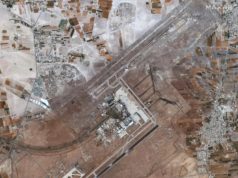Syrian President Bashar al-Asad on Monday gave his third public speech since the country’s uprising began in March at Damascus University. To no one’s surprise, the embattled dictator had nothing new to say and blamed the uprising on international extremists: “What is happening today has nothing to do with reform, it has to do with vandalism,” he said. “There can be no development without stability, and no reform through vandalism…. We have to isolate the saboteurs.”
Monday’s speech came two days after Syrians staged one of the largest protests over the last four months in which security forces killed an estimated 19 people. It was also given one day after Syrian forces entered the northern village of Badama and closed roads leading to its border with Turkey, blocking refugees from fleeing. The soldiers reportedly carried out mass arrests and set fire to homes and buildings, including the only bakery in the area, in an attempt to cut off food supplies from the thousands living in the camps. According to the Turkish government, over 10,100 Syrians have crossed into Turkey to escape Asad’s assault.

A refugee camp for Syrians in the Turkish border town of Yayladagi. |
On Friday, Secretary of State Hillary Clinton published an Arabic language article in the London based Asharq Al-Awsat newspaper. In it she says, “There is no going back…. Syrians have recognized the violence as a sign of weakness from a regime that rules by coercion, not consent. They have overcome their fears and have shaken the foundations of this authoritarian system. Syria is headed toward a new political order.”
In the face of an estimated 1,400 dead and 10,000 detained, one question remains: Is Washington doing all it can to aid in the formation of that new political order and ensure it is one that benefits the Syrian people?





